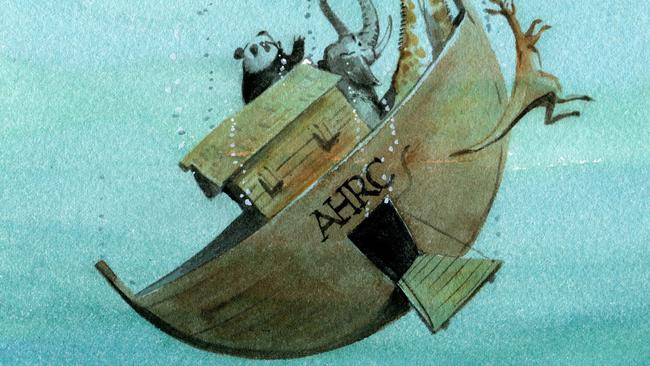
How many preferential appointments will it take before the Commonwealth Public Service fulfils its quota of 129 Tamils, 115 Sudanese and 96 Armenians?
Are Romanians swarthy enough to be assigned a quota of their own, or will they be lumped with the whites, and find their applications languishing at the bottom of the pile?
The details of the Race Discrimination Commissioner’s solution to the “ethnic and cultural default” of Anglo-Celtic leadership have yet to be revealed.
However, may we be the first to congratulate Tim Soutphommasane’s employers for giving a leg-up to Laotians, or perhaps a friendly hand to the French since their man was born in Montpellier.
It’s all so very confusing.
Criticising the commissioner is a delicate business, since denying the need to combat racism is apparently a form of racism itself. And no one wants to get on the commissioner’s bad side, given his statutory powers to make the lives of others hell.
Yet the idea of ethnic job quotas is beyond barmy; it’s frightening. It shows the capacity of grinning do-gooders to devise solutions far more damaging than the problems they assume to solve.
Few migrants to Australia would be comfortable answering questions about biological inheritance at a job interview or, even worse, being subjected to racial profiling by a box-ticking bureaucrat.
Sectarianism belongs to the world many of them left behind, not the land of redemption in which they arrived.
Yet that is where the fetish for diversity is leading.
How else would we assess if a workplace has been sufficiently cured of whiteness?
It would be comforting to imagine that the progressive movement will eventually collapse under the weight of its own absurdity or, if we might be excused for mixing metaphors, fall on the sword of its own hypocrisy.
That is never going to happen, however. The movement needs new wrongs to right in order to survive.
Racism, corporatism, LGBTQism, what-does-it-matterism are means to the same end: to raise the social standing of metropolitan sophisticates and cement their values as the mark of a civilised woman or man.
This is the point Joan C, Williams almost makes in a short, recently published book, White Working Class: Overcoming Class Cluelessness in America. Almost, because as a Hillary Clinton supporter with post-election stress disorder she is not yet ready to acknowledge the inherent divisiveness of identity politics and the damage it causes to the social fabric.
Nonetheless, in a book that tries to explain the rise of Donald Trump to those who find it inexplicable, the feminist legal scholar exposes the sanctimony of the professional-managerial elite, which comforts itself about racism by displacing the blame on to other-class whites.
Displaying oneself as anti-racist is a marker of progressive politics. In doing so they demean the white working-class by constructing it as stupid and racist, she says.
Williams goes on to probe the politicisation of sexual identity.
“The professional class seeks social honour by embracing the edgy,” she writes. “A key way they show sophistication is to signal comfort with avant-garde sexuality … What began as transgression among 19th-century European artists now defines the cultural world of the 21st century.”
Securing approval for a new range of sexualities attracts unlikely bedfellows, Williams notes. It is a cause now embraced by progressives and mainstream conservatives alike.
Indeed, in the Liberal Party of Australia, it is embraced too by those who would reject being called either progressive or conservative, the self-proclaimed moderates for whom same-sex marriage has become a defining cause.
These are strange times indeed. Who would have imagined the party of Bob Menzies would one day become a testbed for identity politics in which members vie for virtue by embracing social causes while the rest of Australia — the forgotten Australians — wonders what got into the water to turn the political class bonkers.
Williams’ thesis — that the group she calls “white working class” has been systematically betrayed by the elite — will be familiar to Australians.
She wanted to call them the middle class, but she was overruled by her editor who said the term would be confusing.
Yet middle-class they are in all but name, aspirational, hardworking people with no desire to change the world, who derive satisfaction from a practical job well done.
They draw moral pride from maintaining their families rather than writing nation-healing Facebook memes and they are nervous about change.
For the elite, “disruption” means founding a start-up. In a working-class job, disruption gets you fired.
The elite’s incomprehension of the presidential election result demonstrates that what Williams calls “class cluelessness” is deeply embedded. The two sides of America have moved so far apart that neither can understand what makes the other tick.
It may not be too late to save Australia from a similar fate, the one we will inevitably face if we continue to toy with the politics of identity.
Ironically it will require respect for diversity, particularly within our major cultural institutions, where the dull and monotonous beat of progressivism has squeezed out alternative points of view. It demands that we stand up to the bullying of organisations such as the Australian Human Rights Commission that attempt to police what can and cannot be said and how we can and cannot behave.
The demand for the racial profiling of employees answers in the affirmative the question of whether the Australian Human Rights Commission has finally lost the plot. It is an organisation without a clear mission, prone to the latest progressive fads and lacking clear leadership.
By promoting identity politics, it obscures national interest, trivialises the things we have in common and makes the country harder still to govern.
Nick Cater is executive director of the Menzies Research Centre.



To join the conversation, please log in. Don't have an account? Register
Join the conversation, you are commenting as Logout